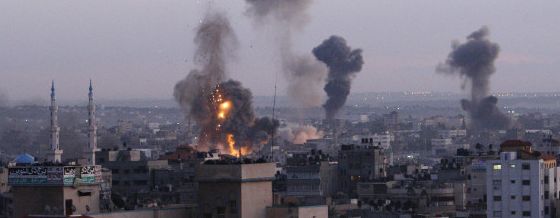
Tony Karon writes: A repeat of the inconclusive 2008 invasion that killed hundreds of Palestinians and destroyed much of Gaza, traumatized Israelis and left their country diplomatically isolated is unlikely to be what the preternaturally cautious Netanyahu has in mind. “The Israelis are not specifying an ambitious end game in terms of clearing out Hamas as [then-Prime Minister Ehud] Olmert did in 2008,” says Daniel Levy, a former Israeli peace negotiator now at the European Council on Foreign Relations. “Instead, they’re talking about ‘reestablishing Israel’s deterrence’, which is a vaguely defined goal. You can claim success whenever you choose to.” Even then, precisely because Hamas has a say in the matter, Netanyahu may not necessarily be able to manage the escalation to his own specifications.
Hamas, meanwhile, has had to reconcile the pragmatic needs of governing in Gaza with those of being a resistance movement, and to navigate the regional political shifts of the past two years. The movement’s leadership is being contested by the Cairo-based Abu Musa Marzook and the Gaza-based prime minister Ismail Haniyeh, who may represent somewhat different orientations. Marzook is part of the exiled leadership that has moved to reposition the movement as part of the regionally ascendant Islamist mainstream, breaking its alliance of convenience with Iran and taking advantage of the emergence of its parent organization, Egypt’s Muslim Brotherhood, as the ruling party in Cairo — as well as the willingness of Turkey and Qatar to strongly back a more pragmatic Hamas. Haniyeh is based in Gaza, where the outlook in the movement has been somewhat more hardline, and where its military wing has more influence than it does in exile. It also faces a constant challenge on the ground from the more radical Salafists eating into its base.
So, while Hamas may have no interest in a sustained confrontation that brings renewed industrial-scale death and destruction upon Gaza’s civilian population, it may find it politically challenging to prevent the sort of retaliation that would require even tougher action according to the Israeli narrative of “deterrence.” Preventing a cycle of escalation is that much more difficult, today, when the politics of the wider Middle East are in flux. Operation Cast Lead in late December 2008 was the beginning of a major rupture in relations with Israel’s longtime strategic ally Turkey, as that country’s moderate Islamist government channeled public rage at the Israeli campaign. Hopes of repairing that relationship remain remote if the Gaza confrontation becomes a sustained one.
Nor can Israel rely, this time, on President Hosni Mubarak serving as the wall at Hamas’ back in Gaza, tacitly supporting Israel’s efforts to break the grip of a movement aligned with his own Muslim Brotherhood nemesis. Egypt today is governed by leaders from Hamas’ parent organization, the Muslim Brotherhood, and is far more responsive to Egyptian public opinion which is innately hostile to Israeli military action in Gaza. Responding to the strikes, the Brotherhood’s Freedom and Justice Party demanded “swift Arab and international action” to stop the Israeli attacks, warning that Israel to “take into account the changes in the Arab region and especially Egypt,” vowing that the new Egyptian government “will not allow the Palestinians to be subjected to Israeli aggression, as in the past.” Egypt is highly unlikely to respond in any way that contravenes the Camp David agreements, but has called for an economic boycott of Israel and summoned its ambassador back from Tel Aviv. Qatar, a key U.S. ally on Syria, has committed a half-billion dollars in reconstruction aid to Gaza, and is unlikely to take kindly to Israeli President Shimon Peres’ exhortation, in a speech Wednesday, to cut ties with Hamas.


And the madness continues. As long as the U.S. supports Israeli actions, there will never be any peace. Sad that such a small country leads the U.S. around like an animal on a leash, while the citizens are the victims on both sides. Keep the war mongers/machine going, keep the “O” showing the world how much he cares for peace.